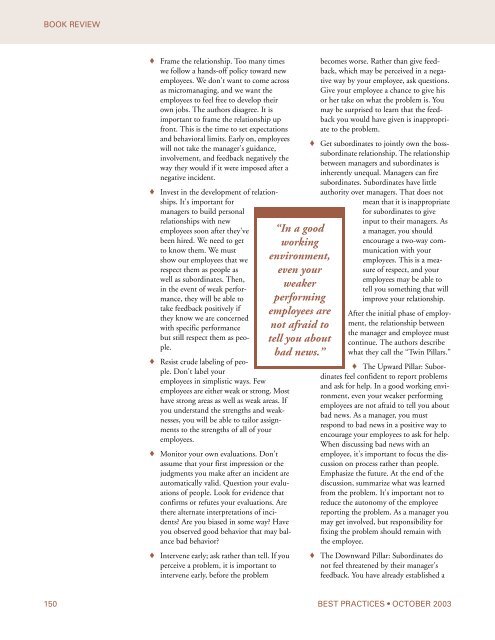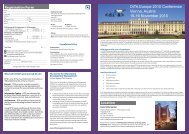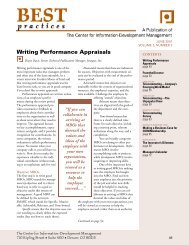October - Center for Information-Development Management
October - Center for Information-Development Management
October - Center for Information-Development Management
Create successful ePaper yourself
Turn your PDF publications into a flip-book with our unique Google optimized e-Paper software.
BOOK REVIEW♦ Frame the relationship. Too many timeswe follow a hands-off policy toward newemployees. We don't want to come acrossas micromanaging, and we want theemployees to feel free to develop theirown jobs. The authors disagree. It isimportant to frame the relationship upfront. This is the time to set expectationsand behavioral limits. Early on, employeeswill not take the manager's guidance,involvement, and feedback negatively theway they would if it were imposed after anegative incident.♦ Invest in the development of relationships.It's important <strong>for</strong>managers to build personalrelationships with newemployees soon after they'vebeen hired. We need to getto know them. We mustshow our employees that werespect them as people aswell as subordinates. Then,in the event of weak per<strong>for</strong>mance,they will be able totake feedback positively ifthey know we are concernedwith specific per<strong>for</strong>mancebut still respect them as people.♦ Resist crude labeling of people.Don't label youremployees in simplistic ways. Fewemployees are either weak or strong. Mosthave strong areas as well as weak areas. Ifyou understand the strengths and weaknesses,you will be able to tailor assignmentsto the strengths of all of youremployees.♦ Monitor your own evaluations. Don'tassume that your first impression or thejudgments you make after an incident areautomatically valid. Question your evaluationsof people. Look <strong>for</strong> evidence thatconfirms or refutes your evaluations. Arethere alternate interpretations of incidents?Are you biased in some way? Haveyou observed good behavior that may balancebad behavior?♦ Intervene early; ask rather than tell. If youperceive a problem, it is important tointervene early, be<strong>for</strong>e the problem“In a goodworkingenvironment,even yourweakerper<strong>for</strong>mingemployees arenot afraid totell you aboutbad news.”becomes worse. Rather than give feedback,which may be perceived in a negativeway by your employee, ask questions.Give your employee a chance to give hisor her take on what the problem is. Youmay be surprised to learn that the feedbackyou would have given is inappropriateto the problem.♦ Get subordinates to jointly own the bosssubordinaterelationship. The relationshipbetween managers and subordinates isinherently unequal. Managers can firesubordinates. Subordinates have littleauthority over managers. That does notmean that it is inappropriate<strong>for</strong> subordinates to giveinput to their managers. Asa manager, you shouldencourage a two-way communicationwith youremployees. This is a measureof respect, and youremployees may be able totell you something that willimprove your relationship.After the initial phase of employment,the relationship betweenthe manager and employee mustcontinue. The authors describewhat they call the “Twin Pillars.”♦ The Upward Pillar: Subordinatesfeel confident to report problemsand ask <strong>for</strong> help. In a good working environment,even your weaker per<strong>for</strong>mingemployees are not afraid to tell you aboutbad news. As a manager, you mustrespond to bad news in a positive way toencourage your employees to ask <strong>for</strong> help.When discussing bad news with anemployee, it's important to focus the discussionon process rather than people.Emphasize the future. At the end of thediscussion, summarize what was learnedfrom the problem. It's important not toreduce the autonomy of the employeereporting the problem. As a manager youmay get involved, but responsibility <strong>for</strong>fixing the problem should remain withthe employee.♦ The Downward Pillar: Subordinates donot feel threatened by their manager'sfeedback. You have already established a150 BEST PRACTICES • OCTOBER 2003





